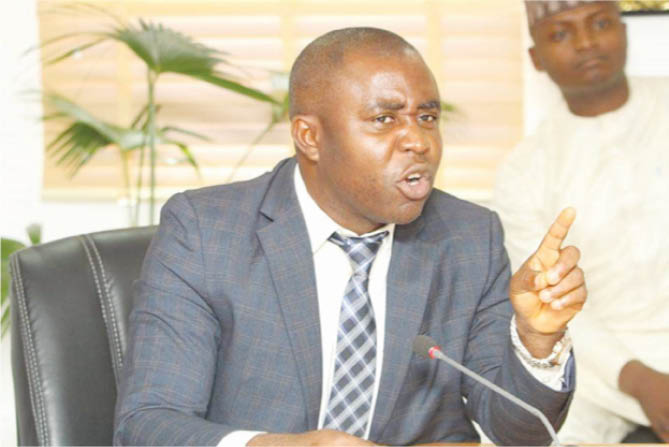Mr. Ikharo Attah, a journalist, became popular for his tenacity while enforcing COVID-19 protocols in the FCT. In this interview, he shares his experience, the challenges and the threats. Excerpts:
For much of last year and early this year, you were heading the enforcement team of the FCT on COVID-19. What was the experience like?
- No partnership will resolve Nigeria’s security situation – UK
- Police dismiss three officers for extorting LASU student
I think for me the experience was a very shocking one. You know, I was shocked when the FCT minister believed in me, and gave me an opportunity that almost changed my career path.
Precisely on September 18, 2019, I offered to discuss with him about the Nyanya-Mararaba road traffic problem, and the next day, on the 19th, he called me to his office. I felt I was going there to get an interview with him but to my shock, he asked me to head a traffic management taskforce in which his CSO would work closely with me.
So when COVID-19 was breaking out, I was very sure that I would go and rest and continue with my journalism, but to my utmost surprise, the minister asked us to work closely with the FCT Police Command Commissioner of Police, Bala Ciroma.
Thereafter, I joined the COVID-19 enforcement team at the Eagle Square. The commissioner of police was the chairman of the team but, surprisingly when we got to the field, having been the Traffic Management Team chairman, everybody kept calling me chairman.
Now, the enforcement experience was intriguing. Firstly, we were supposed to go round and shut down schools but the schools on their own complied with the ministerial directive and shut down.
The religious places of worship and social gatherings now became our main areas of operations. And it was then I realized how deep Nigerians are divided along religious lines.
When we had to shut down churches and mosques, we used diplomacy. I discovered that it would be easier if people are communicated, told what their offences are, than to use force. That is why in all the instances, when we go to the mosque we have to explain to the imam or the ustaz with the Qur’an and Hadith, why he should not do what he was doing.
When we got to churches, we had to refer to the Bible why the pastor should not do what he was doing, and subsequently invite them for questioning, or sometimes bring them before the law.
It was a very tough exercise, but in the end it turned out very beautifully, and somehow you discover that the work that people consider impossible is possible if you are dedicated to the country and want to get it done.
During the lockdown, our main challenge was that personnel in all the services turned their cars into taxis. They were the ones creating problems for us, using their cars to ferry passengers across. When you meet them they bring out their ID card. However, we apprehended many of them and brought them before the mobile court.
So overall, during the enforcement period, how many people were you able to prosecute?
Both during the first and second waves, we prosecuted over 3,000. These were both the low, the high and the mighty. You know! We got Naira Marley. We brought him before justice. We got some very big names – operators of night clubs and lounges including foreigners, we tried them here. Clerics from across the faiths were prosecuted here.
So, looking at the numbers you have prosecuted and the energy you put in the enforcement, would you say that has contributed to the low number of deaths in the FCT?
I think we did an extremely tight enforcement, such that some persons were even wondering where we got the power from.
Many thanks to the FCT minister and the police commissioner who supervised us and supported us to do our duty diligently.
I believe that played a very strong role, because the FCT had become an epicentre of the COVID-19 pandemic. The FCT and Lagos were contending with the high numbers of infection cases on almost daily basis. So we had to really work hard across board here. I believe that contributed very much in how we flattened the curve during the first wave and the second wave as well..
Considering that the job you were doing was very difficult and unpopular; to some people who were at the receiving end. Did you feel threatened at any point, did you feel insecure?
No. I think I did not feel insecure. Even if I felt at a point in the course of the work, because shutting down Wuse and UTC markets was no mean feat. I must admit that the minister actually gave me full security cover. He was very concerned about my security. He really gave me full security.
At certain points, some people had gone to the minister to complain about my work but he would always stand by us.
What really made me felt uncomfortable was when people wanted to play the religious card. When we went to the churches and I made some arrests, some people would ask me why did you go to church? Why did you not go to the mosque? “You arrest a pastor, you must arrest an imam to balance it.”
You see, we do not work that way – if we do not find any imam who is guilty then we do what is right thing to do. There was a day we went on enforcement, and we got two pastors and three Imams. Somebody said; “it cannot be two pastors and three Imams, go and balance it three-three. Go and look for one other pastor to add.”
But we told them that you cannot reduce the country and the fight against COVID-19 to a religious war, where you have to go out to look for equal number of clerics. It is not a war between Christians and Muslims, but a war against a pandemic, and anyone who defaults must explain. And that is what I found really very worrisome.
So, has the taskforce wound up, because there appears to be a lull in your activities?
No. We are still working, but what we are doing now is largely advocacy. Once in a while we supervise, once in a while we guide people on what to do – physical distancing, wearing of face mask, use of hand sanitizer, disinfecting places, reducing the number you may have during an event and all the safety protocols. But the arresting, and the prosecution, we do not do that now.

 Join Daily Trust WhatsApp Community For Quick Access To News and Happenings Around You.
Join Daily Trust WhatsApp Community For Quick Access To News and Happenings Around You.


